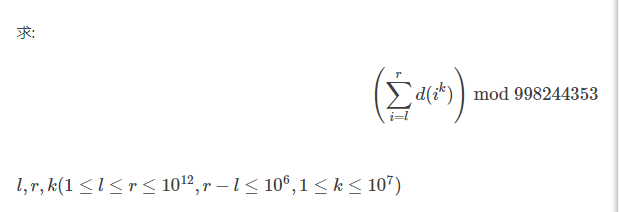Counting Divisors
Time Limit: 10000/5000 MS (Java/Others) Memory Limit: 524288/524288 K (Java/Others)
Total Submission(s): 3170 Accepted Submission(s): 1184
Problem Description
In mathematics, the function d(n) denotes the number of divisors of positive integer n.
For example, d(12)=6 because 1,2,3,4,6,12 are all 12's divisors.
In this problem, given l,r and k, your task is to calculate the following thing :
For example, d(12)=6 because 1,2,3,4,6,12 are all 12's divisors.
In this problem, given l,r and k, your task is to calculate the following thing :
(∑i=lrd(ik))mod998244353
Input
The first line of the input contains an integer T(1≤T≤15), denoting the number of test cases.
In each test case, there are 3 integers l,r,k(1≤l≤r≤1012,r−l≤106,1≤k≤107).
In each test case, there are 3 integers l,r,k(1≤l≤r≤1012,r−l≤106,1≤k≤107).
Output
For each test case, print a single line containing an integer, denoting the answer.
Sample Input
3
1 5 1
1 10 2
1 100 3
Sample Output
10
48
2302
Source
Recommend
题目大意:

求 l<= t <=r, 求 对多有满足条件的t 的 d(t^k)=t^k的所有因子的个数 的总和
题解:
根据约数个数定理:n=p1^a1×p2^a2×p3^a3*…*pk^ak,n的约数的个数就是(a1+1)(a2+1)(a3+1)…(ak+1).
只要求1~1e6之间的素数,如果当某个数除完前面的素数的时候还!=1,那么那个数字就是>1e6的素数。
#include <iostream> #include<cstdio> #include<algorithm> #include<queue> #include<map> #include<vector> #include<cmath> #include<cstring> #include<bits/stdc++.h> using namespace std; const long long mod=998244353; long long ans,l,r,k,len; int T; long long f[100000],num[1000005],a[1000005]; void pre() { bool flag; len=0; f[++len]=2; for(int i=3;i<=1e6;i++) { flag=1; for(int j=2;j<=sqrt(i);j++) if (i%j==0) {flag=0; break;} if (flag) f[++len]=i; } return; } int main() { pre(); //预处理出1~1e6之间的素数 scanf("%d",&T); for(;T>0;T--) { scanf("%lld%lld%lld",&l,&r,&k); for(int i=0;i<=r-l;i++) {num[i]=1; a[i]=i+l;} //num【i】表示 i 这个数的因子个数 ans=0; for(int i=1;i<=len;i++) { long long s=(l/f[i])*f[i]; if (s<l) s+=f[i]; for(long long j=s;j<=r;j+=f[i]) { long long w=0; while(a[j-l]%f[i]==0) { a[j-l]/=f[i]; w++; } num[j-l]=num[j-l]*(w*k+1)%mod; } } for(int i=0;i<=r-l;i++) if (a[i]>1) num[i]=num[i]*(k+1)%mod; //特殊判断还剩下的数字!=1的情况,也就是还有一个大素数 for(int i=0;i<=r-l;i++) ans=(ans+num[i])%mod; printf("%lld ",ans); } return 0; }